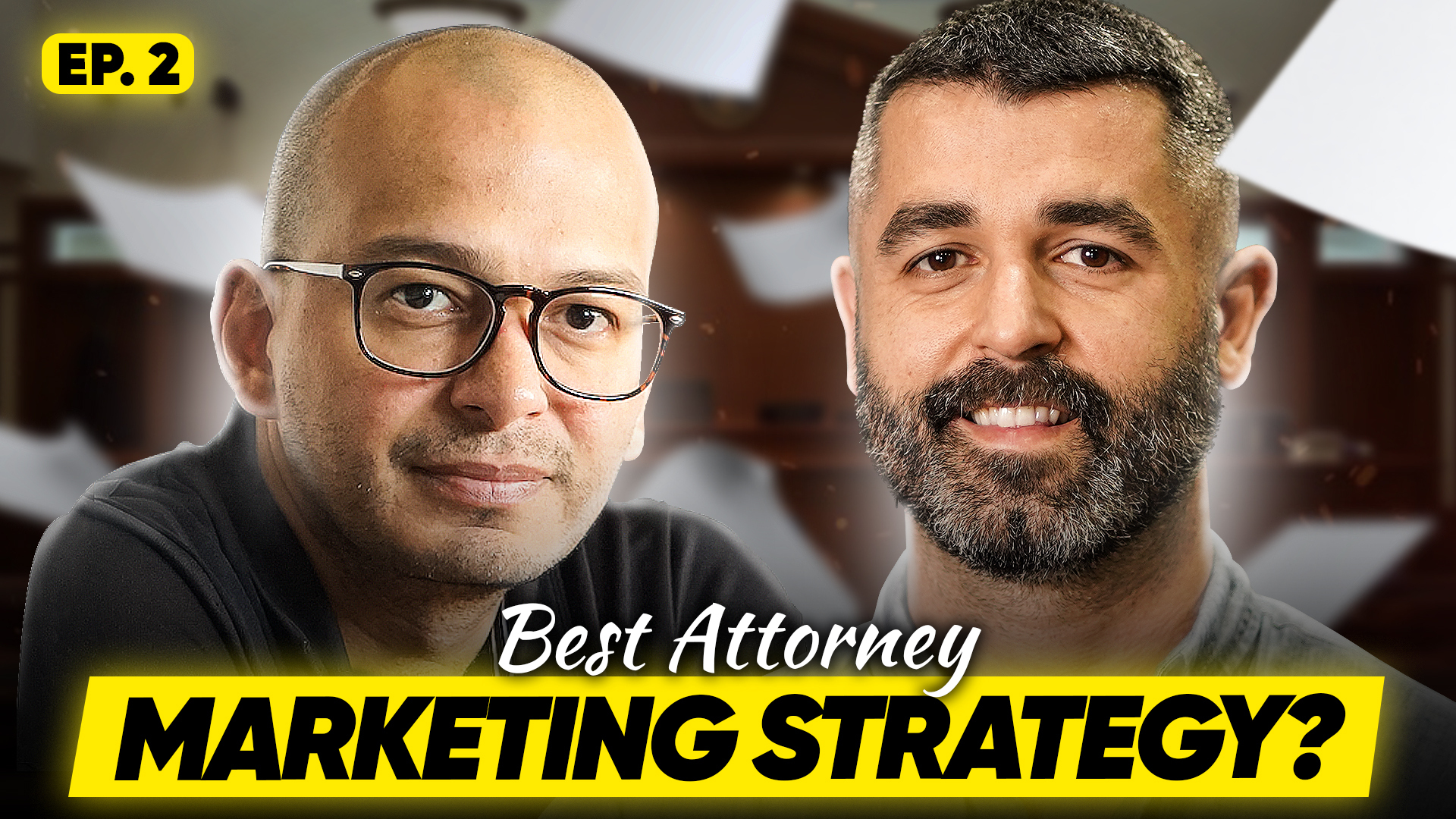
Attorney Marketing Strategies (Ranked & Reviewed)
Attorneys today are facing two problems: an influx of competition from solo practices and one too many tire-kicking prospects.
So not only are cheaper attorneys attracting your would-be clients. You also have a string of incoming calls, from “potential” clients who will never convert.
If you’re like most law firms, generating leads isn’t the issue. You can get calls and emails all day long.
The real issue is generating new and clients.
That’s what we’re going to help you with today. Stay tuned to learn the proven attorney marketing strategies that drive results with as little effort (from you) as possible.
Check out our videos for deeper insights, or tune in to our Podcast for legal marketing insights on the go.
Why are lawyers struggling today?
According to a Martindale 2020 report, lawyers aren’t just stressed about working long hours and dealing with difficult clients. They’re also facing issues with booking new clients.
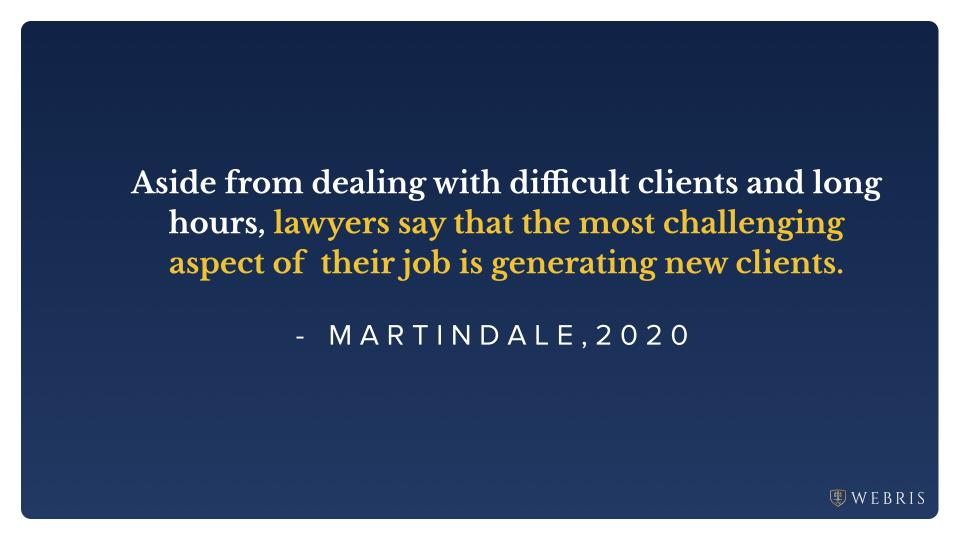
Put it like this: Each year, colleges are filled with tens of thousands of hopeful students looking for a safe, but lucrative legal career. In 2021, over 35,000 law students graduated in America.
Throw this on top of the 1.3+ million attorneys already practicing in the US and the projected 10% growth year-of-year, and you can see the dilemma.
The legal field is a crowded one, especially with more graduates opening up solo firms instead of joining established firms.
Why are they doing this?
Because many can’t find good respect for work and/or aren’t getting the pay they desired. So they open the virtual doors of their own legal firm. All you need today is a website with your contact details and a form to automate the collection of leads.
It’s a gift and a curse because it gives you the opportunity to be your own boss with low overhead. However, this privilege is available to every graduate from American law universities.
How do you compete for web traffic if your site is drowned out by hundreds or even thousands of others in your space? Lucky for you, we have the answer to that.
And it doesn’t involve spending millions on advertising. Small budgets are the bane of small law firms today. The million-dollar budgets of larger firms are suppressing the little guys (and gals) making it seem impossible to compete with their television ads, billboards, and bus ads.
But where there’s a will, there’s a way.
With the strategy we’ll reveal, you’ll see that oversized budgets aren’t necessary to win big.
Channels used in their attorney marketing strategies
Those looking to save money and reach large audiences turn to the internet to drive results. Smart move. A poll run by the American Bar Association in 2020 shows the top marketing channels law firms use are:
- Event sponsorships used by 48%
- LinkedIn used by 42%
- Email used by 41%
- Facebook used by 33%
- Print media used by 21%
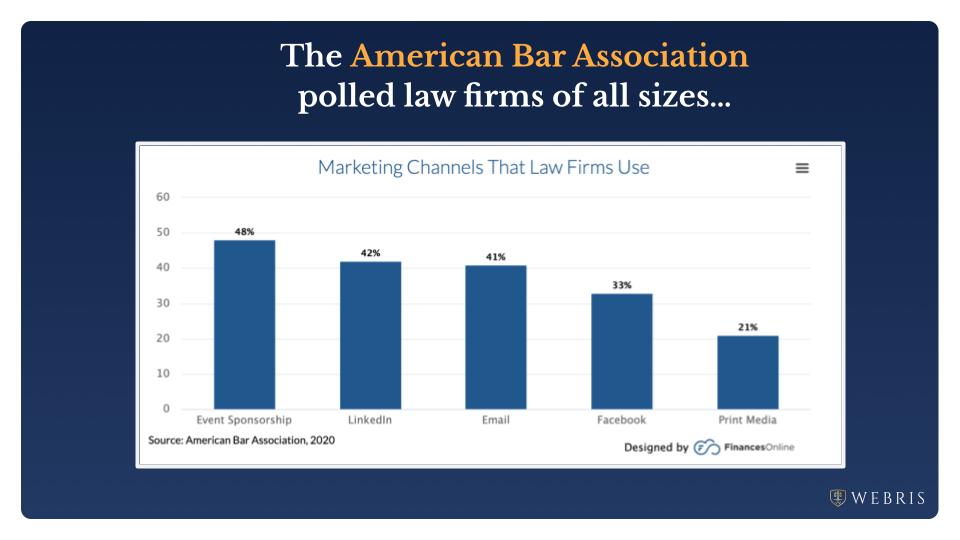
A nice mix of tactics, but not enough if you don’t have a strategy behind it. By executing a holistic digital marketing campaign, you can outsmart your top competitors instead of trying to outspend them.
So if you’re on a limited budget, then focusing on the top revenue-generating channels is the way to go.
But which channels should you invest in for your law firm?
Hint: Not billboards and TV ads.
At least, not right away. Not to say expensive print media and airwaves aren’t effective. It’s just not an ideal place to start.
Take Airbnb for example. It pioneered the model of beginning with digital marketing and then after they exploded in popularity within its target market, it moved up to television and radio spots. At this point, they already reached the level of brand awareness and could focus on wooing their audience with memorable marketing messages and offers.
It’s a model that works in today’s digital age. Law firms must adapt to a digital-first mindset before venturing into traditional offline advertising methods.
We tested multiple attorney marketing strategies (here’s what we found)
Digital marketing can be a cost-effective, high-conversion strategy when you implement the right techniques. Attempting to approach it without a solid strategy is where it can get expensive and non-productive.
Some lawyers may even override the concept of tools like pay-per-click (PPC) ads and social media marketing because they failed to generate results. But again, it’s not the channels that are bad — it’s how and when you use them.
Think of it like a puzzle — you must fit the pieces together perfectly to produce the “big picture” objective you want to achieve.
But we don’t want to just talk about the possibilities of each advertising channel. So we tested them all to see the results.
Here’s how we did it: We selected 11 channels attorneys use most frequently and then rated them all based on the following criteria:
- Results
- Cost
- Time to results
- Effort
- Scalability
Then we generated a total score to determine which were the most effective.
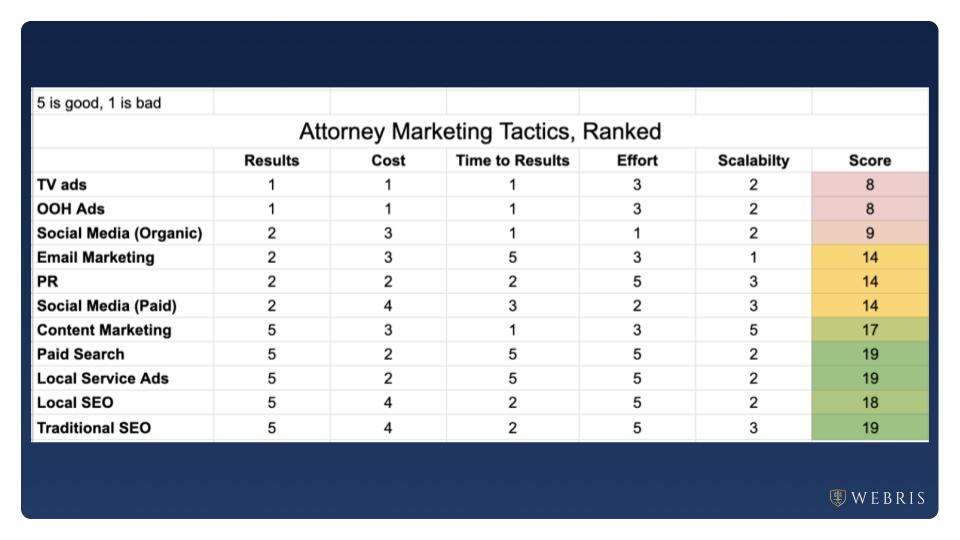
Each criterion is graded 1 to 5 — five being the best.
Let’s break down the results.
TV and OOH ads
Turn on the television. Tune in to the radio. Ride down a busy highway. Odds are, you’re going to see or hear your competitors posted everywhere. Television and out-of-home ads are the traditional forms of advertising for lawyers.

But are they the most effective? And more importantly, do they offer the best bang for your buck (and time)?
If you’re a major law firm, then using these channels makes perfect sense. You have the budget, notoriety, and trust of the community. But when you’re a small or mid-sized law firm lacking these characteristics, it’s too expensive and won’t offer a return on investment.
That’s because these channels are for memory building, not lead generation. When folks see or hear a legal ad, they don’t think all of a sudden that they need one. People look for attorneys when they’re in a legal conundrum and need assistance.
So here’s our analysis of these channels:
- Results: Conversions are very low (Score 1 )
- Cost: Expenses are high (Score 1 )
- Time to results: Produces slow results as you’re shooting darts in the dark (Score 1)
- Effort: Requires low effort from law firms (Score 3)
- Scalability: Has limited scalability (Score 2)
- Overall score: 8
Organic social media marketing
Using social media to drive organic traffic to your law firm can work. But not when you don’t have a large following or time to build one. The best way to perceive this channel is as a relationship builder. It won’t drive a ton of fresh leads, but could keep your law firm top of mind when someone needs a referral.
It’s also ideal to have updated social media profiles and a presence on these channels if a prospect decides to look you up. It’s an opportunity to build your credibility as a legit law firm (hopefully with raving reviews from past clients).
Most attorneys lack time to dedicate to organic social media marketing and instead hire an agency, which costs a pretty penny. And unless you already have a solid following, you won’t see much of an ROI, if any, from this channel.
So the verdict for organic social media marketing based on our analysis:
- Results: Conversions are low (Score 2)
- Cost: Not much cost involved, only time (Score 3)
- Time to results: Slow results (Score 1)
- Effort: Requires a lot of effort for managing social media page, creating content, and engaging the audience (Score 1)
- Scalability: Has limited scalability (Score 2)
- Overall score: 9
Email marketing
Email is an excellent channel for marketing because it increases the odds of prospects not only seeing your promotions, but actually clicking on them. However, this will only generate results if you have a sizeable list of subscribers.
You can’t expect a flow of leads if you’re working with an email list of 50 people. Email marketing requires time to build your list using other marketing methods, such as blogging, guest blogging, and PPC advertising.
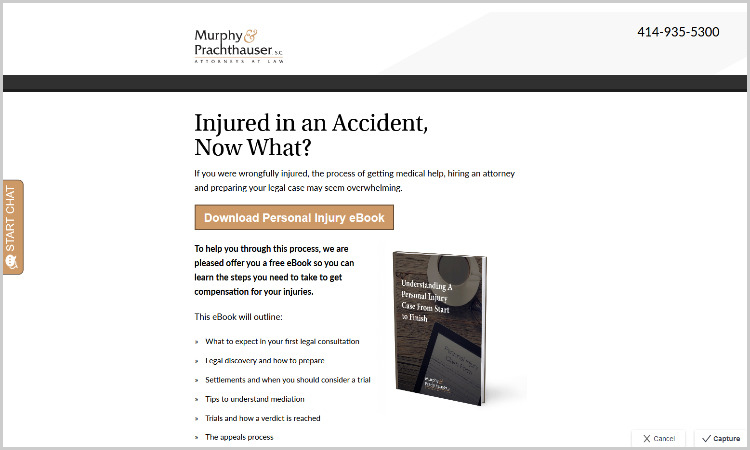
So don’t write off email — just add it to your list of things to do after you implement other marketing strategies to increase your subscriber base.
Then you must determine if you’ll manage the planning and execution of your email marketing or hire an agency to do it on your behalf.
Here’s our analysis of email marketing:
- Results: Medium-low results(Score 2)
- Cost: Medium to high cost, depending upon software and copywriting costs (Score 3)
- Time to results: When people sign up to a newsletter, they’re already showing interest in your service and have a higher chance of converting (Score 5)
- Effort: Medium-high effort, since you must plan, write for, and analyze email campaigns (Score 3)
- Scalability: Growing your email list with qualified leads isn’t easy (Score 1)
- Overall score: 14
Public Relations
Being featured in an article or publishing a guest blog post for a popular website is an effective way to get attention, especially if it goes viral. But attention doesn’t always equate to conversions.
PR isn’t a strategy lawyers should use to generate new clients right away. It’s a method to build your law firm’s visibility and credibility. Sure, people may read your article and remember you when they need you in the future. But it’s not going to trigger a ton of calls because legal services aren’t something you just “stumble upon” and buy.
Then there’s the amount of work required to get a piece of content published in a notable publication. This is why larger firms work with PR agencies, which can be too expensive for a small law firm. However, it’s something you should consider down the road after building organic traffic to your site.
When you couple PR with organic search marketing (blog posts published on your site), you can use PR pieces to drive traffic to these blogs, which can boost your post’s ranking in Google.
Once you’re ready to invest in PR, we recommend hiring a professional team — and expect to pay $1,000 per month to get good results.
Based on our analysis, PR has the following results:
- Results: Medium-low results (Score 2)
- Cost: Expensive to hire PR agencies (Score 2)
- Time to results: It takes time to see conversions (Score 2)
- Effort: Minimum efforts, since you’re hiring an agency (Score 5)
- Scalability: Some scope of scalability, depending on your budget (Score 3)
- Overall score: 14
Paid social media advertising
Buying ads on social media is a quicker way to drive traffic to your website compared to organic social media. You design an ad, bid on keywords relevant to your law firm, and watch the traffic roll in. Each time someone clicks on your ad, you pay the price you bid for that keyword.
If no one clicks, you pay nothing.

Sweet deal, but only if those clicks turn into leads. Unfortunately, few (if any) people head to social media to search for a lawyer. So focusing your efforts here when you’re in need of new clientele isn’t the way to go.
However, once you build your law firm’s client base and want to invest in more visibility, then opt for paid social. Just remember that this is a long play for lead generation in the legal industry — the more people see your ads, the more likely they’ll remember you when it comes time to hire a lawyer.
So the results for paid social based on our analysis:
- Results: Medium-low (Score 2)
- Cost: Not too expensive (Score 4)
- Time to results: Takes some time to convert (Score 3)
- Effort: Pretty much the amount of effort to create ads and run campaigns (Score 2)
- Scalability: Medium-high (Score 3)
- Overall score: 14
Content marketing
When someone needs a lawyer, what do they do? Odds are, they head to Google or another search engine and type in a search term. Whatever shows up at the top of the results earns their clicks, calls, and conversions.
But to get here, you need a strategy that uses a mix of search engine marketing techniques. One of these techniques is content publishing and distribution. By targeting the right keywords and producing high-quality, high-value content your audience is looking for, you’ll rank faster and higher in the search engine results pages (SERPs).
But without a team of writers and strategists, you’ll spend a lot of time learning and writing to pull off high rankings and conversions from your content.
So our analysis for content marketing is:
- Results: High potential for conversions, since the traffic is looking for you (Score 5)
- Cost: Medium-High, depending on the agency and writers you hire (Score 3)
- Time to results: Gives slow but long-term results (Score 1)
- Effort: Moderate efforts are required to create content, depending on how involved you are in the planning and creation (Score 3)
- Scalability: Great potential to scale results by publishing more content (Score 5)
- Overall score: 17
Paid search and local service ads
There are two ways to appear at the very top of Google’s SERPs, and that’s to either pay for local service ads or PPC ads:
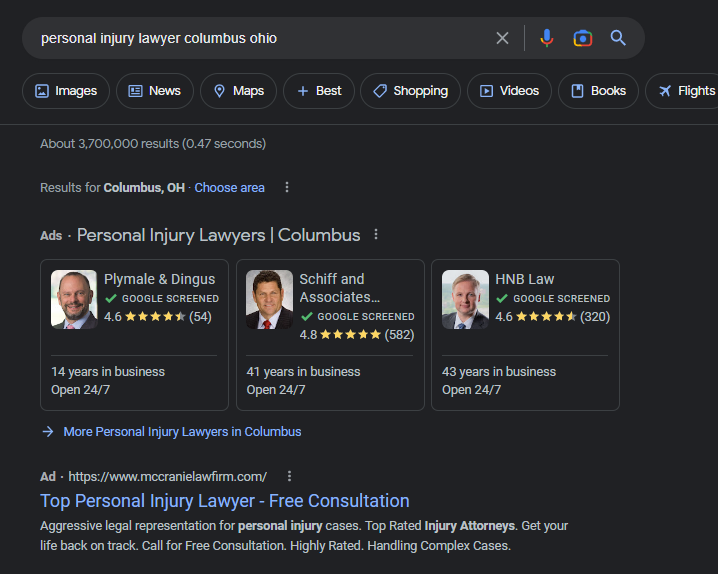
At the top, you’ll find the more impressive and noticeable local service ads. It features photos of the lawyers, years of experience, and hours of operation. Then the star rating and Google Screened checkmark makes the ad attention-grabbing and trustworthy.
The text ad beneath it is from a PPC campaign. It also appears that the top of the SERPs, but won’t get as much attention as the ads with the faces on it. Not every search term brings up local service ads, so it’s still good practice to invest in text PPC ads.
These require a lot of testing and analysis to get the best results, which can be time-consuming and costly for the inexperienced. So you’re better off working with a digital marketing agency specializing in legal search engine marketing.
And based on our analysis, it should be in every law firm’s strategy tool kit:
- Results: Clicks from qualified leads, since they’re searching for your services (Score 5)
- Cost: Moderately high cost, since you’re paying for an agency and ad budget (Score 2)
- Time to result: Same-day traffic boost (Score 5)
- Efforts: Low efforts, but need expertise (Score 5)
- Scalability: Limited scalability (Score 2)
- Overall score: 19
Local SEO
If you’re using content marketing and paid ads in your law firm marketing strategy, then tying in local search can give you dominance in search results.
This is how:
- You have local service ads at the very top above the #1 organic search result
- PPC ad beneath
- Top-ranking content under the paid search results
- Then an appearance in the local pack 3 — the three business listings that appear next to Google map
In other words, you’re all over the top of the search engine results page, increasing your odds of getting clicks from prospective clients.
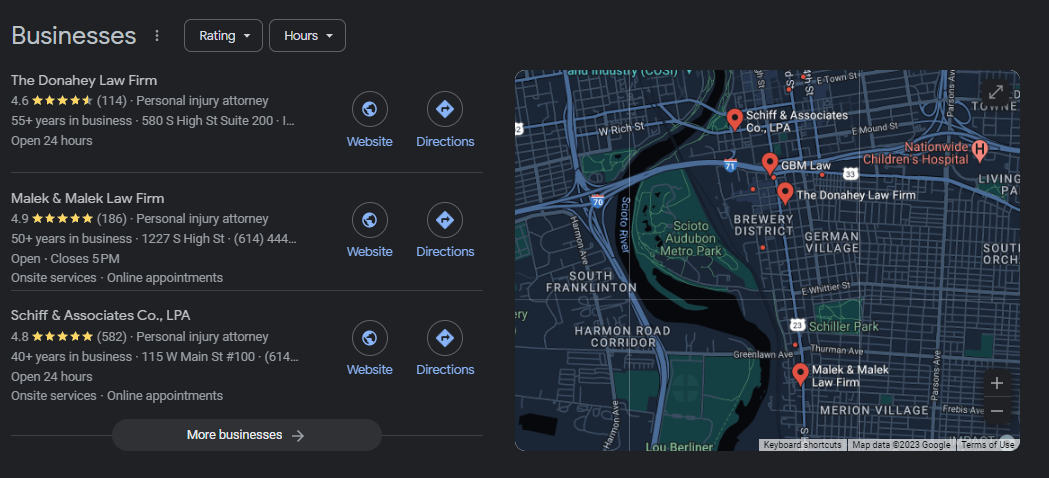
(Also appears before the #1 spot in Google)
Based on our analysis of local SEO, it’s a keeper for attorney marketing strategies:
- Results: High potential to get attention from hot leads (Score 5)
- Cost: Low expense, since you’re just optimizing your Google My Business (Score 4)
- Time to results: Takes time, since it’s an organic approach and takes time to rank (Score 2)
- Effort: Low efforts — you create your GMB profile once and update as needed (Score 5)
- Scalability: Limited scalability, since there’s no way to pay to win (Score 2)
- Overall score: 18
Traditional SEO
Traditional search engine optimization for law firms extends beyond just content marketing. While this helps with boosting your organic traffic, there’s more to it than publishing fresh blog posts.
Here’s a look at some traditional SEO tactics:
- Backlink building via guest posts to drive traffic to your site
- Optimizing web pages, such as service pages and the home page (not just blog posts)
- Running technical SEO audits to ensure Google bots can crawl and rank your pages
- Optimizing landing pages for conversions (conversion rate option or CRO)
- Adding FAQs to pages to increase visibility and traffic (targets People Also Ask section in SERP)
- Ensuring mobile optimization so your site is responsive to any device and screen size a visitor uses
This isn’t an all-conclusive list but gives an idea of the various tasks and the time investment required. It’s not something you can do on a weekend — it’s a full-time job and too competitive to do in-house. So your best bet is to hire an SEO agency that can do this for you.
Not implementing traditional SEO into your marketing strategy risks you falling behind competitors who are.
Based on our analysis of using traditional SEO for law firms, we found the following:
- Results: High odds of getting quality leads ringing your phone (Score 5)
- Cost: Low cost compared to traditional advertising (Score 4)
- Time to results: Takes time to see results, but worth the wait (Score 2)
- Efforts: Low efforts – you can hire an agency(Score 5)
- Scalability: Moderate scalability (Score 3)
- Overall score: 19
The takeaway: Search engines first, then the rest
Jumping the gun and attempting to go toe-to-toe with the big leagues in the legal industry doesn’t make sense if you’re not on their level. Smaller law firms should use savvier strategies to gain visibility without the insane costs of billboards and TV ads.
With search engine marketing — content marketing, paid search, and traditional SEO — you can generate hot, non-tire-kicking leads from the world wide web.
Don’t get me wrong — TV, OOH, PR, and social media are considered push marketing channels and have a place in legal marketing. It’s what you use to build upon your brand recognition to drive results. You’re pushing your ads in front of people and hoping they connect with you.
But search engine marketing techniques are considered pull marketing tactics. Instead of trying to create a wave, you’re allowing the wave (aka traffic) to form itself and then your content and assets drives them to your website.
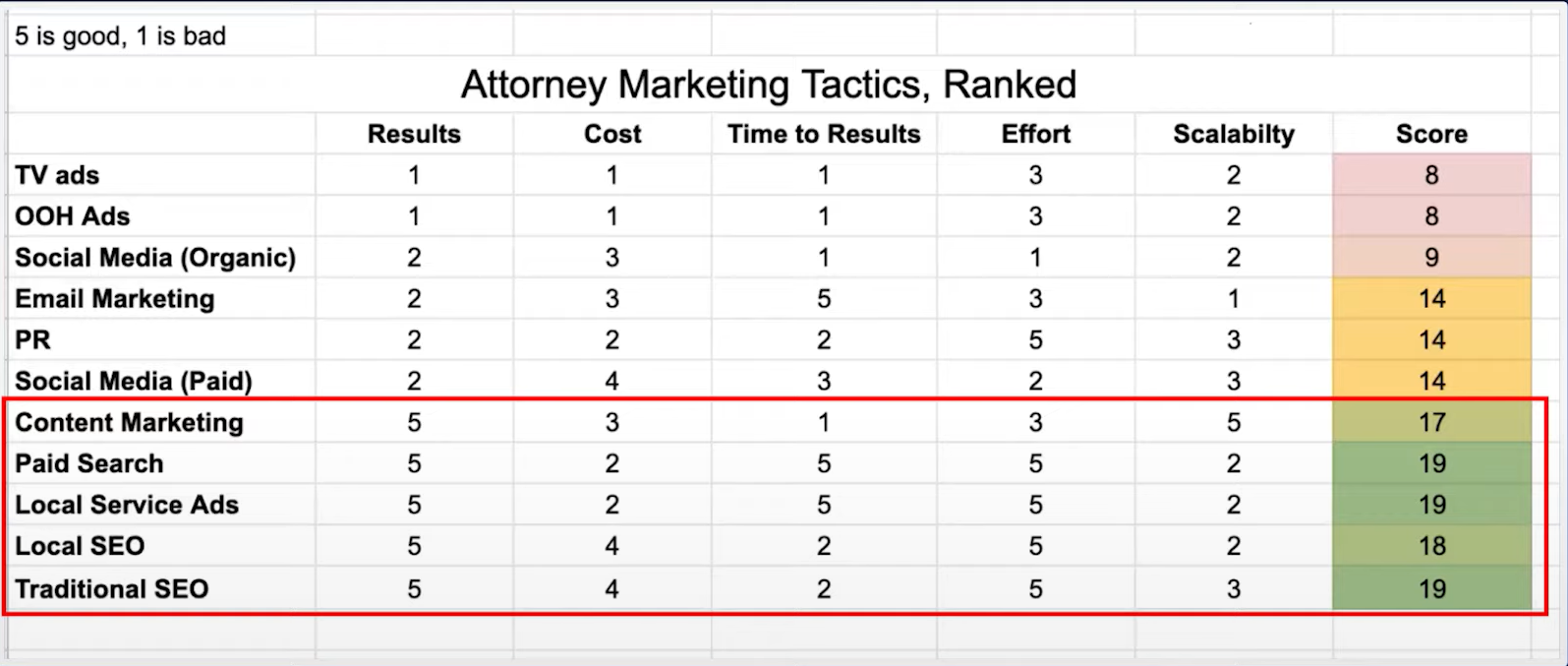
It’s like using the gravity of a falling rock to pull it to a target vs. pushing against it. Which do you think will give you the best outcome?
Pull marketing yields better results — hands down.
If you’re an attorney looking to build a marketing strategy that doesn’t waste your time or money, and delivers leads that convert — let’s book a time to talk.
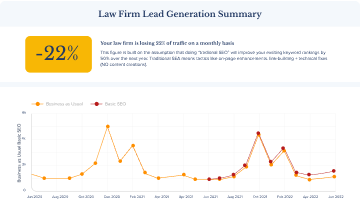
Your Website Is Losing Money!
Find out how many leads your website SHOULD be getting through our Traffic Projection Analysis.
FIND OUT MOREIs Your Website Costing You Clients?
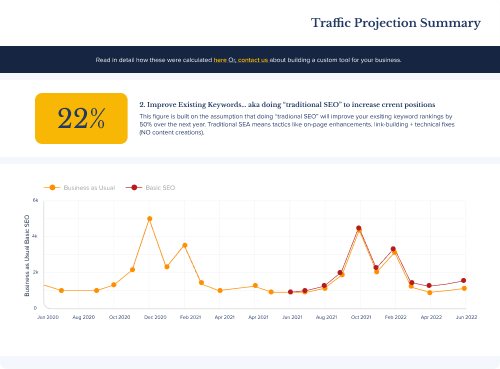
Is Your Website Costing You Clients?
Find out how many new cases your website SHOULD be getting through our Traffic Projection Analysis.
A data driven analysis that accurately forecasts how much traffic (and cases) your website should be getting from Google each month.
BOOK MY ANALYSIS